Certificates in Advanced Veterinary Nursing
If you are a practising Registered Veterinary Nurse, and want to take your career and personal development to the next level, while making a positive impact on your clinical practice, we have a study pathway to suit you!
The RVC’s Graduate Certificate (programme spec pdf) and Postgraduate Certificate (programme spec pdf) courses are part-time, distance-learning, advanced veterinary nursing qualifications awarded by the RVC and University of London.
These qualifications provide progression options for Registered Veterinary Nurses qualifying from all existing level qualifications (from Level 3 Diploma through to BSc). Depending on your entry qualifications, you can apply to enrol on either the level 6 Graduate Certificate or level 7 Postgraduate Certificate (see Entry Requirements).
If you wish to develop greater professional knowledge and skills with particular focus on clinical patient care and subject area specialism (either Medical Nursing, Emergency & Critical Care or Anaesthesia and Analgesia), then these courses are for you. Our courses are designed to empower you with advanced knowledge and skills, positioning you as a top candidate for specialised roles in clinical practice.
Taster Sessions
Curious about the Certificate in Advanced Veterinary Nursing (CertAVN) and want a flavour of what it’s like to study with us while earning free CPD hours? Join us for our free taster sessions. Register at the links below:
CertAVN Taster Session: Medical Nursing Wednesday 29 October 2025 20:00
CertAVN Taster Session: Emergency & Critical Care Tuesday 2 December 2025 20:00
CertAVN Taster Session: Anaesthesia & Analgesia Tuesday 6 January 2026 20:00
Introduction
Why study at the RVC?
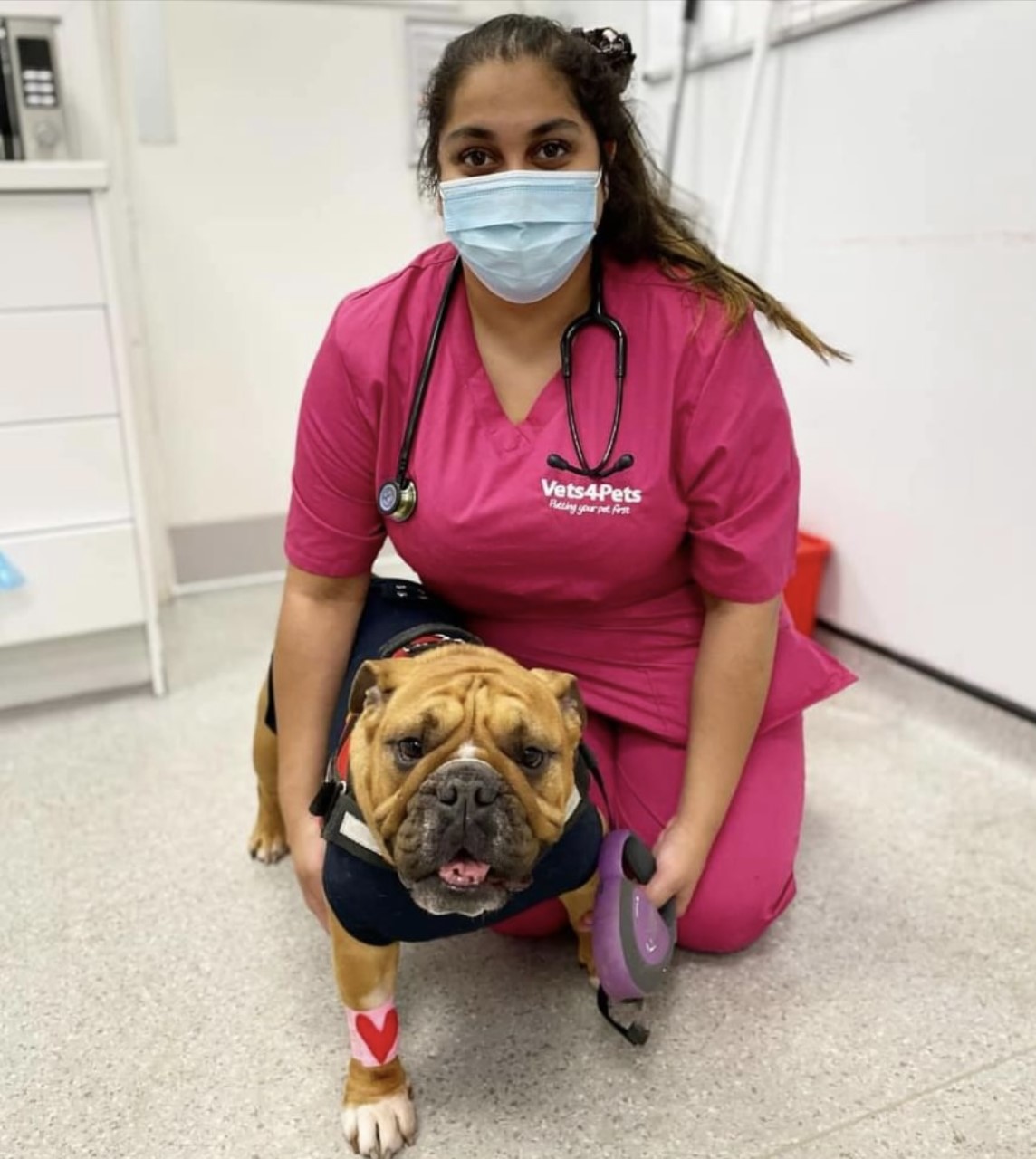
These Certificates are managed and taught by our dynamic team of leading veterinary nurses and veterinarians who are recognised by employers both within the UK and internationally.
The Course Director has over 15 years of experience running and delivering online post registration qualifications for veterinary nurses and is delighted to be able to offer RVNs these accessible, affordable and flexible study options.
The RVC has a well-established programme in VN Higher Education, setting up the first BSc Honours in Veterinary Nursing in Europe in 1998. Since this time, the RVC’s Centre for Veterinary Nursing has been providing excellence in VN education, and specialist and advanced online VN courses. This means we have the expertise and experience to deliver a programme, which combines a course of high academic standard with an exciting and effective delivery method.
Whether you work in a first-opinion practice, a charity clinic or a large specialist referral practice, you will be dedicated to providing outstanding nursing care for your patients and staying up-to-date with the latest evidence and techniques. Studying at the RVC will enable you to join a community of passionate professionals committed to advancing their careers and making a meaningful impact on animal health and welfare, and help you to shape the future of the veterinary nursing profession.
Accreditation
As a graduate of the course you will receive a University of London qualification and will be able to use the letters GradCertAVN or PGCertAVN after your name.
RCVS Accreditation
Our Medical Nursing, Emergency & Critical Care and our Anaesthesia & Analgesia specialism pathways are also accredited by the RCVS, which means you have the option to gain a Certificate in Advanced Veterinary Nursing qualification awarded by the RCVS as well - see RCVS Accreditation.

RCVS 2023 Quality Improvement Champion award
RVC School of Veterinary Nursing commended for excellent Quality Improvement initiatives
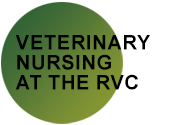 Veterinary Nursing at the RVC
Veterinary Nursing at the RVC
Find out more about what veterinary nursing at the RVC can offer you, your career and your team. Veterinary Nursing at the RVC
Our Medical Nursing, Emergency & Critical Care and Anaesthesia & Analgesia pathways are accredited by The Royal College of Veterinary Surgeons (RCVS), which means you also have the option to gain a Certificate in Advanced Veterinary Nursing qualification awarded by the RCVS.
Candidates applying for and enrolling with the RCVS CertAVN in Medical Nursing, Emergency & Critical Care or Anaesthesia & Analgesia must meet the specific requirements as set out by the RCVS, to qualify you must:
- Be on the current RCVS Register of Veterinary Nurses.
- Have evidence of sufficient CPD from the point of entry onto the RCVS Register for Veterinary Nurses (in line with the RCVS requirements) prior to registration for the RCVS CertAVN.
- During studies, be employed in, or have agreed access to a placement in, a suitable professional environment, tailored to their area of focused study.
- Before commencing studies, enrol with the RCVS specifying the accredited university or awarding organisation where they plan to undertake their studies and the title of the qualification.
Registration for the RCVS CertAVN will be valid for up to five years.
Further information: www.rcvs.org.uk
RCVS fees
Candidates applying for and enrolling with the RCVS in order to gain an RCVS Certificate in Advanced Veterinary Nursing are required to pay additional fees as set out by the RCVS as follows:
- Pay RCVS initial enrolment fee of £87* at the start of the course
- On completion of the course, £220* to the RCVS
For more information about RCVS fees please see their website: RCVS Fees.
* Fees at August 2025. Check RCVS website for current fees
Modules will run subject to minimal (and maximum) numbers. You will be informed before the commencement of the module in the event of a particular module choice not being available to you.
| Graduate Certificate (Level 6) and Postgraduate Certificate (Level 7) | |
|---|---|
| May to July |
15 credits This includes three compulsory attendance online orientation days: Wednesday 29 April 2026 9am-5pm Thursday 30th April 2026 9am-5pm Tuesday 2nd June 2026 9am-5pm |
| September to December |
FUNDAMENTALS IN ADVANCED VETERINARY NURSING PRACTICE 15 Credits |
| January to July |
45 Credits from the designation pathway list below |

Modules

This eight-week introductory module is designed to prepare you for higher education using a variety of contemporary teaching and learning methods. We'll help you develop strategies for managing all aspects of your studies, forming a foundation that will support you on subsequent modules and can be transferred to your professional and personal life.
Through a variety of activities you will develop lifelong learning strategies and gain essential skills in:
- Self and time management
- Information literacy and research strategies
- Understanding principles of evidence-based practice
- Academic writing and critical reflection
Midway through the module, you'll attend compulsory online Orientation Days to meet fellow students and tutors and develop a collaborative support network. These experiences will help you become a self-directed, reflective, and lifelong learner.
To qualify for the Certificates in Advanced Veterinary Nursing, you must complete and pass this module and attend the Orientation Days.
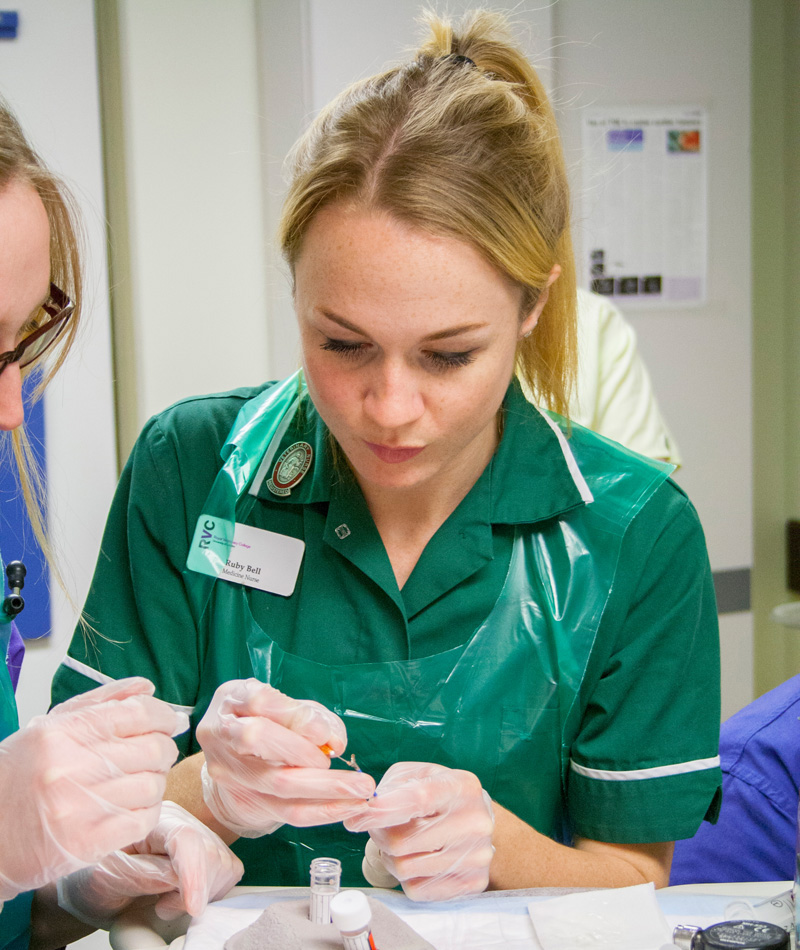
This nine-week module equips you with skills and expertise required to provide a critically evaluative and evidence-based approach to your advanced veterinary nursing practice. You will examine fundamental theory and concepts of professional practice including: veterinary nursing process, legal and professional decision-making frameworks and evidenced-based practice, and apply these to review and develop a reflective and evaluative approach to patient care. You will also challenge your assumptions and views of veterinary nursing practice, evaluating societal needs for the continued development of the veterinary nurse’s role within the veterinary industry and wider context.
The aim of this module is to stretch and challenge your views and assumptions of contemporary veterinary nursing practice. Through integration of concepts that underpin advanced level veterinary nursing care in the veterinary practice setting, you will explore and discuss your professional role and leadership responsibilities. You will apply new concepts and frameworks to enable you to provide an informed and evidence-based approach to your patient care and clinical decision-making. This will include the ability to effectively plan, implement and evaluate the most appropriate nursing care protocols for patients in a wide range of practice settings; reviewing your professional responsibilities in relation to patient and owner preferences, the legal system, the statutory body and key ethical principles.
Pathways (Designation Elective Modules)
Medical Nursing – 45 credits
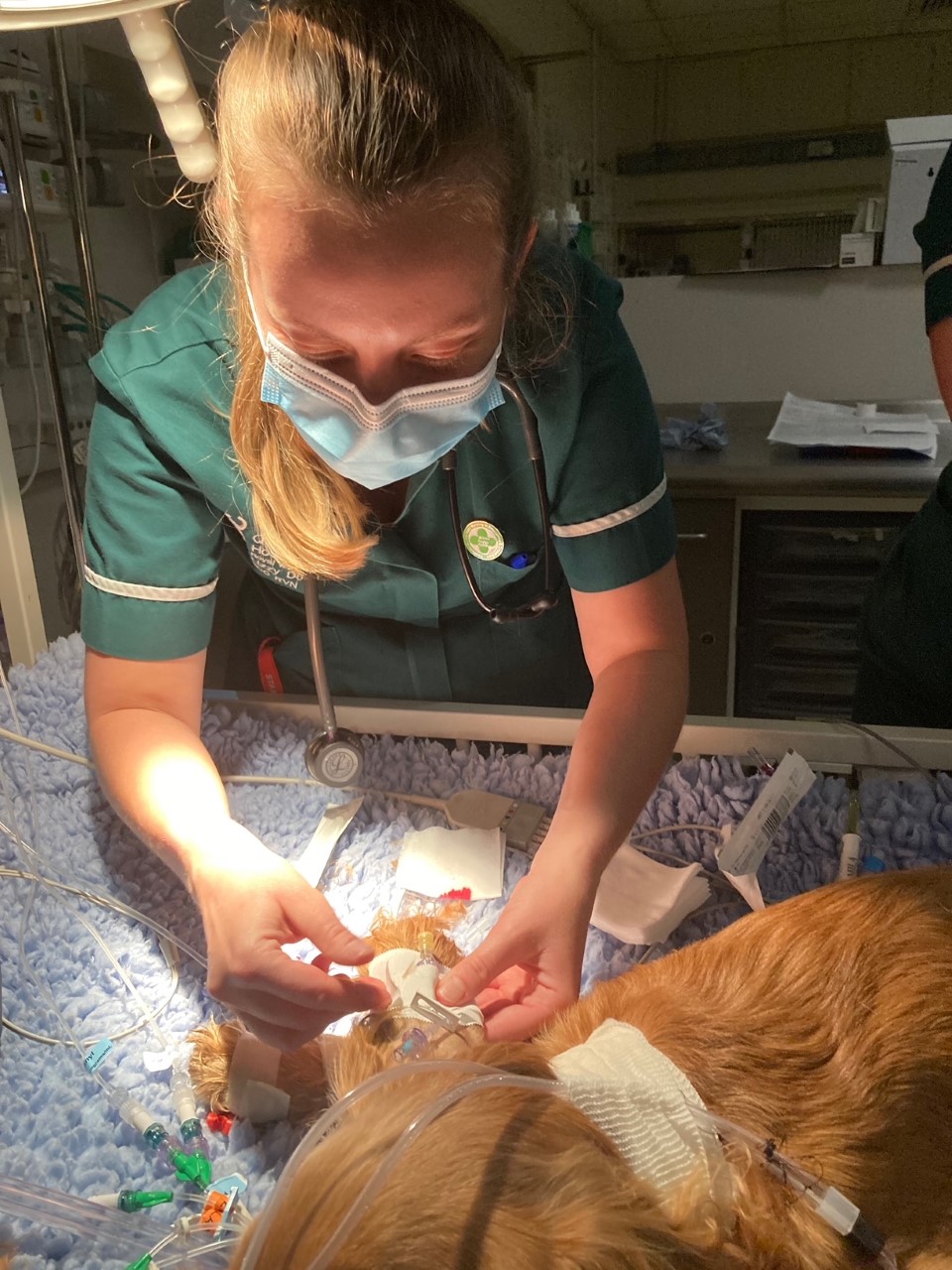
Over three 8-week units you will develop and advanced level of knowledge of the pathophysiology, diagnostic investigation and treatment of infectious diseases and disorders affecting the haemopoietic, respiratory, gastrointestinal and endocrine systems. You will develop strategies for critically assessing patient needs, planning appropriate patient management and applying knowledge to care. You will also develop an advanced level of knowledge of the usage of commonly administered therapeutics encountered during medical nursing and of the interactions and adverse effects of medical therapeutics, thus contributing to optimal patient care and enhanced protocols. Evidence based guidelines for careful infection prevention and control (IPC) techniques are discussed and key risk indicators for patients within a hospitalised setting will be highlighted to allow the implementation of action plans to reduce the spread infection.
Topics covered in these units are:
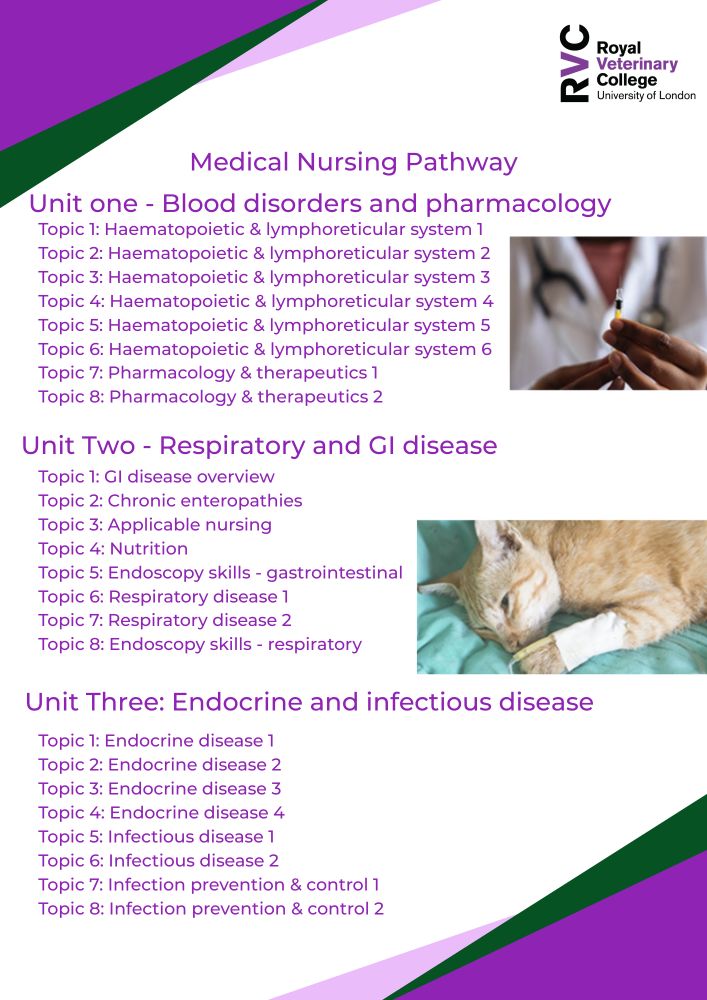
Anaesthesia and Analgesia - 45 credits
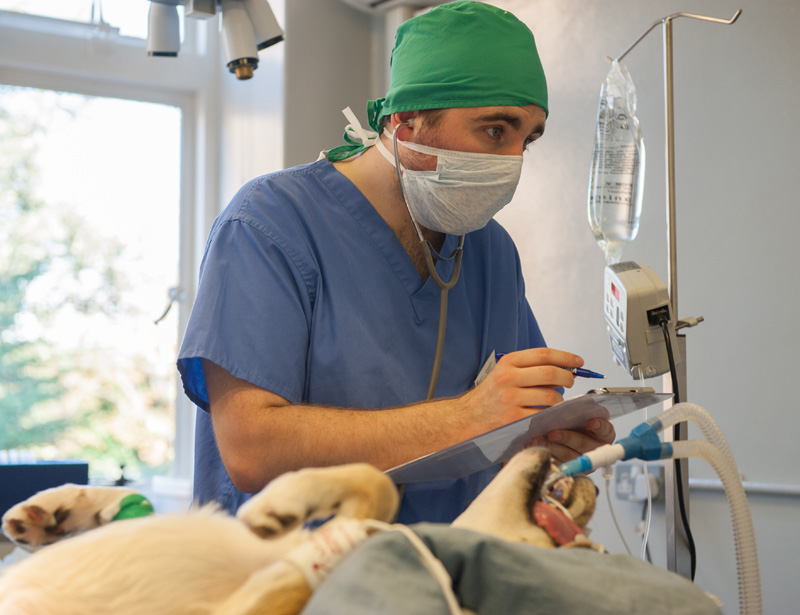
Over three 8-week units you will focus on developing and integrating theoretical knowledge, which can be used to provide advanced nursing support applicable to anaesthesia in all types of veterinary practice. You will explore different types of drugs used during anaesthesia and the range of anaesthetic monitoring equipment. You will also enhance your knowledge of pain pathways, and the assessment and treatment of pain. Using patient scenarios to build upon and develop your newly acquired knowledge, content will be explored by critically reviewing current evidence and practice, and problem-solving, thus equipping you with the competence to assess future developments and where they might fit into improving the nursing care of patients. The aim of this module is to enable you to enhance your clinical competence in the care of veterinary patients undergoing anaesthesia. Through directed activities you will gain skills to deliver high-quality, evidence-based care that is appropriate to the needs of the patient under your care.
Topics covered in these units are:
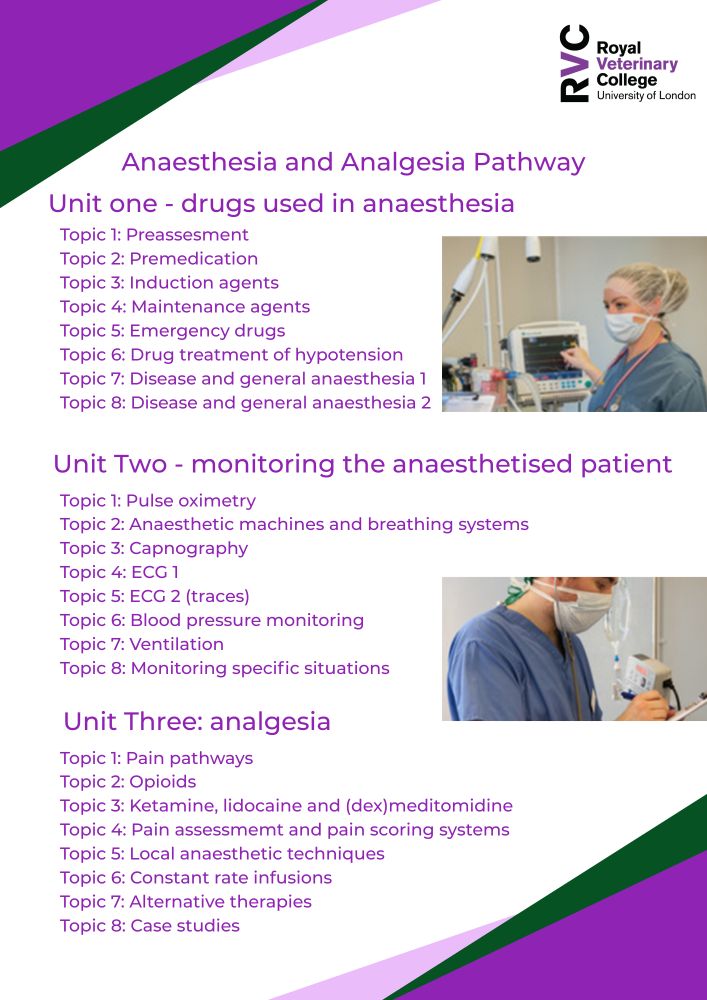
Emergency and Critical Care - 45 credits
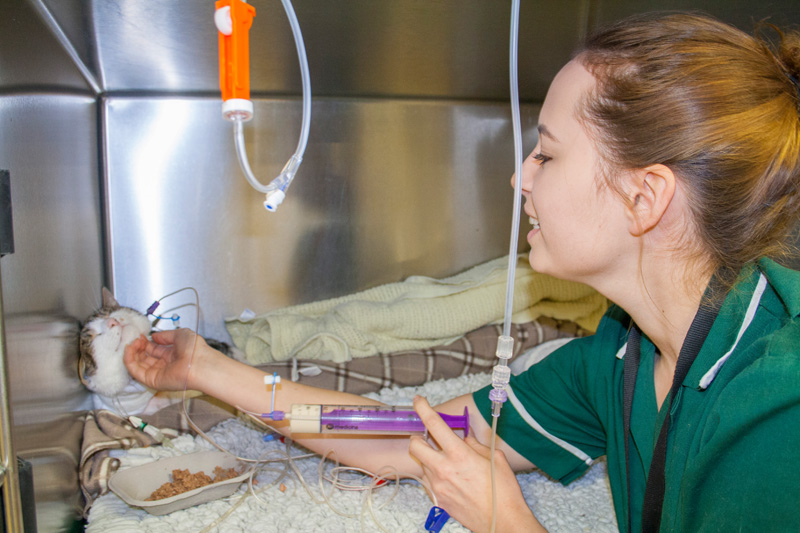
Over three 8-week units you will develop an advanced understanding of emergency and critical care nursing. You will explore the skills and techniques required to provide advanced nursing support to emergency and trauma patients, gaining the necessary knowledge to manage emergency cases from presentation through the stabilisation process. This unit aims to equip you with the theory, processes and practices required for the management of conditions associated with emergency and critically ill patients. You will integrate theoretical and practical knowledge to develop a structured and analytical approach to these patients. You will develop skills in the assessment, planning, intervention and evaluation of common conditions on a system-by-system basis, and investigate specialist techniques and procedures enabling you to deliver high quality care that is evidence based and appropriate to the needs of the patient.
Topics covered in these units are:
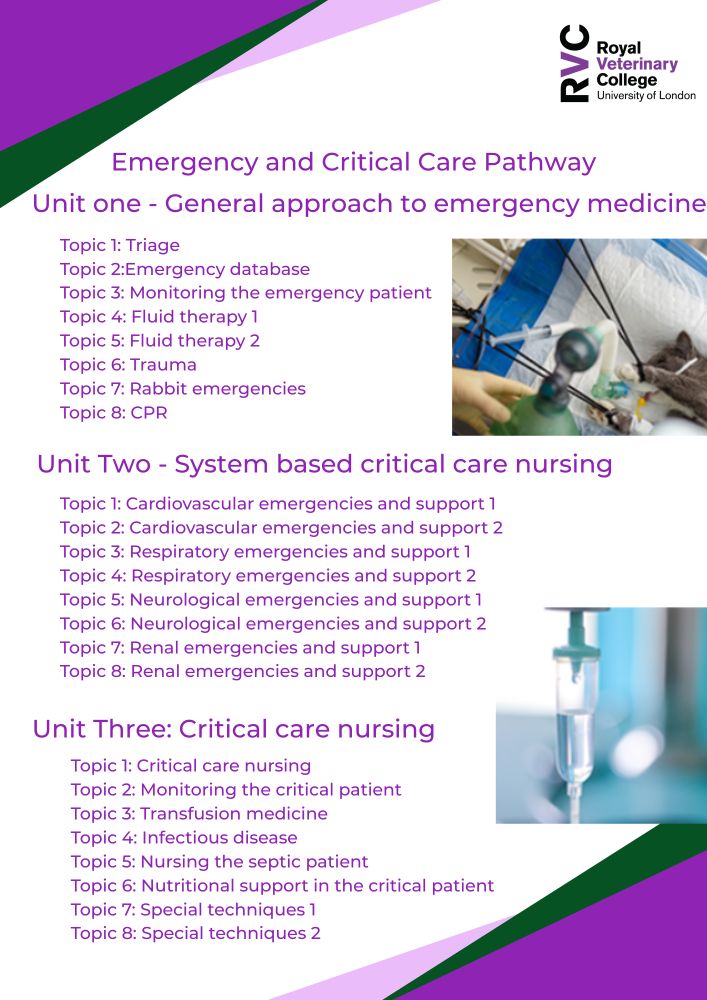
Programme delivery
These flexible awards are designed to be completed in just over a year (part-time) and are delivered entirely online via the RVC’s online Virtual Learning Environment (VLE), Learn. This method of study allows you to continue to work in clinical practice; giving you flexibility to balance your study with your work and family commitments, wherever you are in the world.
Through our VLE, Learn, you are able to access your learning materials where and when you want to, and the online mode also provides opportunity for interactive activities so that you can feel connected to us and your fellow CertAVN students throughout your studies.
Our academic and course support team have over 15 years of experience running and delivering online post registration qualifications for veterinary nurses and we use a range of teaching, learning and assessment activities to stimulate you and reignite your passion in your nursing career.
The courses focus on developing your critical thinking, using both theory and its practical application, enabling you to become better equipped to care for your patients and take on leadership positions within your career.
Assessment
Throughout the course a range of assessment activities are used. All assessment activities have been selected to promote your deep and effective learning, leading directly to your improved understanding of the subject and application of your knowledge.
Assessment tasks include a combination of:
- Written assignments throughout and at the end of each module which are based on activities relevant to the advancement of veterinary nursing in clinical practice (for example, carrying out a knowledge summary, patient care report and clinical audit report).
- Participation in online discussion
- Unseen examination
Publishing Your Course Work
At the RVC, we encourage all of our VN students and especially our CertAVNs to become actively involved in helping to develop a veterinary nursing knowledge and evidence-base and one way they can do this is by publishing their course work. A number of our previous VN students, both Graduate Diploma and CertAVN, have submitted their written summative coursework for publication. Take a look at some of their work: RVC VN Publications.
Compulsory and optional attendance
We appreciate the challenges associated with being able to get away from work, organising childcare and the additional cost of travel with possible overnight stay, and so the vast majority of your time with us, will be online rather than on campus. However, we still want you to feel very much part of the College community and feel completely at ease with making full use of the academic, support and administrative teams who are here to make your study as rewarding and successful as possible. Therefore, we have built into the programme some optional attendance day opportunities.
Compulsory attendance during the Orientation Days

During your bridging module, Contemporary Study Skills, there are three compulsory online attendance days (Orientation Days), the dates of which will be provided to you in advance. During your days with us, you will develop the foundations for an effective and collaborative support network, further perfect your study skills techniques and discover a range of learning activities to help you during your studies on the course. Delivery of these sessions will be via compulsory online attendance.
We require compulsory attendance during these online Orientation Days because these sessions provide you with the key foundation skills and introductions required for the duration of your studies. You’ll get to meet the course team, your module leaders and many other key academic and support staff. You'll find out more about what the course entails; how it runs, discover more about what's required of you and also how to access the online resources you'll be needing throughout your study. Importantly, you'll start working with your fellow CertAVN students and building your support network, which will set you up for successful study habits and get you ready for that important first assignment.
Optional attendance for Clinical Enhancement Days
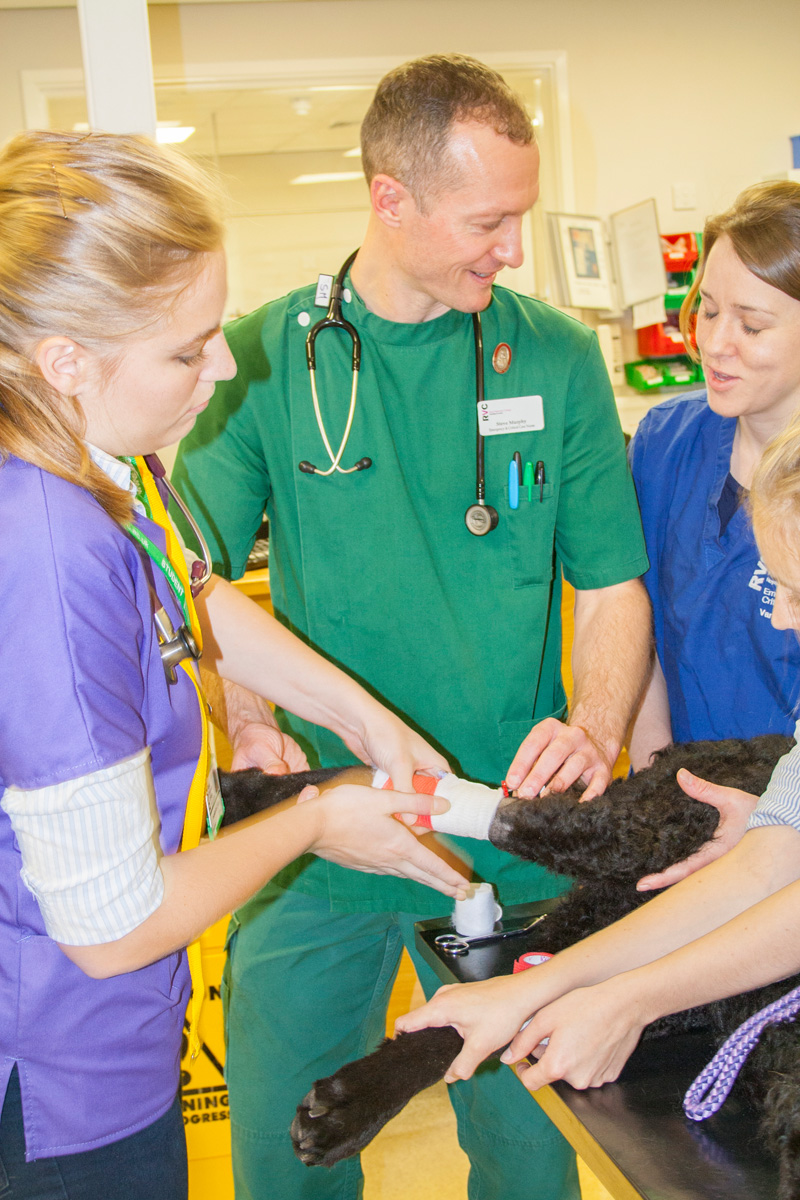
Clinical enhancement days are unique to our Certificates in Advanced Veterinary Nursing courses and they provide you with the opportunity to come and spend some time at the RVC's Queen Mother Hospital for Animals (QMHA). These clinical enhancement days enable you to work alongside specialist veterinarians and veterinary nurses and experience life in Europe's largest veterinary teaching hospital. The QMHA specialists treat over 7,000 animals each year, leading the way in clinical practice and are at the cutting-edge of veterinary medicine. There are no extra charges (other than transport and/or accommodation if required) to attend these Clinical Enhancement Days.
These Certificates are managed and taught by our wonderful team of leading veterinary nurses and veterinarians who are recognised by employers both within the UK and internationally.
The programme is led by:
- Perdi Welsh BSc (Hons), PGCertVetEd, DipAVN (Surg), FHEA, RVN
Course Director and Director of Veterinary Nursing
Perdi has over 15 years of experience running and delivering online post registration qualifications for veterinary nurses,
And is supported by:
- Niamh Clancy DipVN HEDipVN DipAVN PGCertVetEd FHEA
Anaesthesia RVN and Senior Teaching Fellow
Co-Deputy Course Director
- Lyn O’Byrne DipAVN (Med) PGCertVetEd FHEA RVN
Emergency and Critical Care RVN and Senior Teaching Fellow
Co-Deputy Course Director
Each module has subject specialists assigned as module leaders. They act as your personal tutor, helping you navigate through the module and setting a series of collaborative tasks, assignments and online discussion activities. Your lecturers bring a wealth of experience, knowledge and perspective from veterinary clinical practice.
Module Leaders
- Veronica Brewster BSc PhD FHEA
Educational Development Manager - Niamh Clancy DipVN HEDipVN DipAVN PGCertVetEd FHEA
Anaesthesia RVN and Senior Teaching Fellow - Barbara Glanamann Dipl ECVIM-CA, PGDipVetEd FHEA, MRCVS
Senior Lecturer in Small Animal Medicine - Lyn O’Byrne DipAVN (Med) PGCertVetEd FHEA RVN
Emergency and Critical Care RVN and Senior Teaching Fellow - Hilary Orpet MScVetEd BSc DipAVN(Surgical) FHEA CertEdDipCABT(COAPE) RVN
Senior Lecturer and Deputy Director of Veterinary Nursing - Gina Parkes DipAVN (SA), PgDipVetEd, FHEA, RVN
Head Medicine Nurse and Teaching Fellow in Medical Nursing - Amanda Rosier BSc Med QTS
Study Skills Tutor - Perdi Welsh BSc (Hons), PGCertVetEd, DipAVN (Surg), FHEA, RVN
Course Director and Director of Veterinary Nursing
And supported by:
- Emma James
Programme Support Coordinator
During the programme you will develop a range of skills and new knowledge, and you will:
- Benefit from exposure to some of the best clinical specialists in the UK
- Join a community of like-minded individuals all striving to enhance the professional status of the veterinary nurse
- Develop an appetite for lifelong learning
- Have the potential to publish work developed as part of your course studies - see Published papers
So far 48 students have successfully completed the level 6 Graduate Certificate in Advanced Veterinary Nursing, and 31 students have successfully completed the level 7 Post-Graduate Certificate in Advanced Veterinary Nursing. We currently have a further 26 level 6 and 28 level 7 students enrolled on the course.
By the end of your studies, you will:
- Be better equipped to influence the health and welfare of patients under your care
- Be able to apply new solutions and approaches to often complex problems, in practice and provide enhanced input to your clinical teams
- Benefit your patients, your colleagues, and practice’s clients with your motivation and ability to make an enhanced contribution to the workplace
- Employ enhanced communication skills with clients and other members of the veterinary care team.
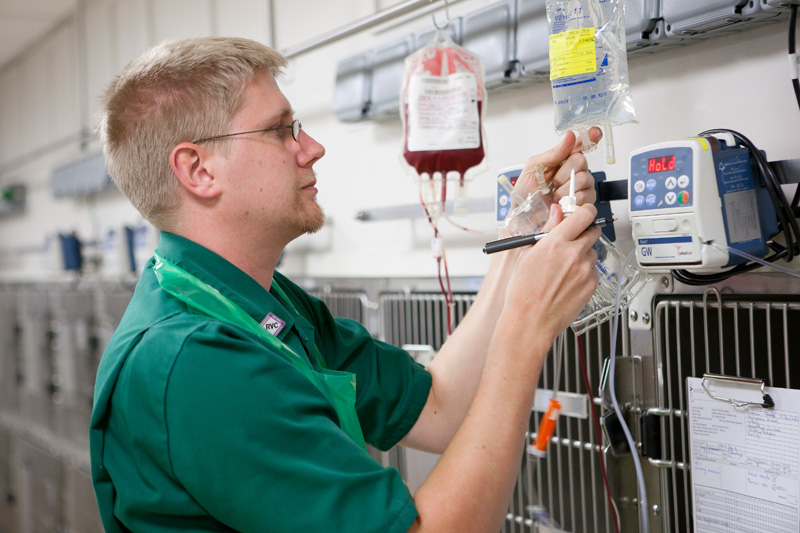
Graduate Certificate
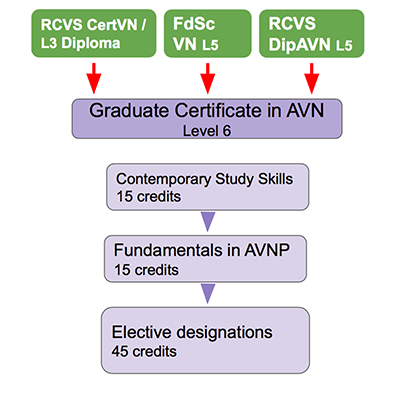
To apply for a place on the Graduate Certificate, you must hold an:
- RCVS Level 3 Diploma or
- Previous RCVS Certificate or
- FdSc VN or
- RCVS DipAVN
(i.e. qualification lower than FHEQ level 6)
And you must:
- Be on the current RCVS Register of Veterinary Nurses (or hold a recognised accredited overseas equivalent professional qualification/status).
- Be employed in, or have agreed access to placement in, a suitable professional environment, (i.e. where you can be exposed to patients in your area of focused study).
- Have the support of your employing/supervising veterinary practice, who will be required to allow time and access for training.
- Have successfully completed the Contemporary Study Skills bridging short-course (unless given permitted exemption).
*Suitable professional environments must be general veterinary practices, which are able to demonstrate a minimum of RCVS PSS tier 2 (or TP standard). We recommend that a minimum of fifteen days per 15-credit elective module is spent working in a clinical setting associated with the pathway taken (e.g. with access to critical care and/or emergency patients if the Emergency and Critical Care Nursing module is taken).
Postgraduate Certificate
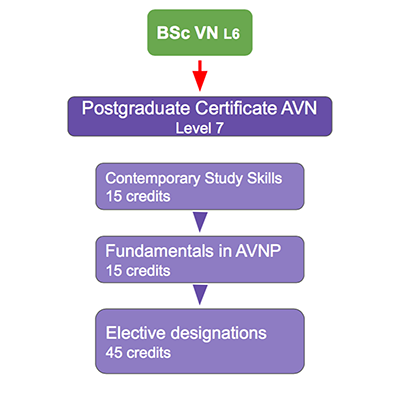
To apply for a place on the Postgraduate Certificate, you must hold a:
- BSc VN or
- RVC Graduate Diploma or
- Other FHEQ level 6 qualification
And you must:
- Be on the current RCVS Register of Veterinary Nurses (or hold a recognised accredited overseas equivalent professional qualification/status).
- Be employed in, or have agreed access to placement in, a suitable professional environment, (i.e. where you can be exposed to patients in your area of focused study).
- Have the support of your employing/supervising veterinary practice, who will be required to allow time and access for training.
- Have successfully completed the Contemporary Study Skills bridging short-course (unless given permitted exemption).
*Suitable professional environments must be general veterinary practices, which are able to demonstrate a minimum of RCVS PSS tier 2 (or TP standard). We recommend that a minimum of fifteen days per 15-credit elective module is spent working in a clinical setting associated with the pathway taken (e.g. with access to critical care and/or emergency patients if the Emergency and Critical Care Nursing module is taken).
English language requirements
All applicants must have achieved at least a Grade 4/C in GCSE English Language or have an acceptable alternative English Language qualification
Please see our English Language Requirements page for a list of qualifications we accept as alternatives to GCSE. If you have taken an IELTS, the requirements are as follows:
- IELTS (Academic) score of 6.5 or above with minimum 6.0 in each component
Applicants who have not achieved the required standard at the point of application may be made an offer that is conditional upon achieving it.
Letter of reference and employer approval
As part of the application form, you are required to provide a letter of reference from your current employer. The letter of reference must confirm that your current employer has agreed for you to undertake this course and that they will support you in carrying out a clinical audit in practice as one of your assessment activities.
There are two ways you can provide the reference as part of the application process. Either you can upload the letter (this must be on headed paper, containing their signature and contact details) or you can provide us with their contact details via the referee contact mechanism. Please be aware that selecting the latter option will prompt an automatic email to be sent to them from the RVCs Admissions Team to your selected referee, upon submitting your application.
International Applicants
International applicants must hold a recognised accredited overseas equivalent professional qualification.
If you hold an international qualification but are practising as a Veterinary Nurse in the UK you must have RCVS registration.
Please contact our Admissions Team for further information and to check the equivalency of your professional qualification.
In the event of courses being oversubscribed
In the event that these courses are oversubscribed, our decision is also based on your overall suitability for the course. We will be looking for evidence of this in your Personal Statement and this is your opportunity to demonstrate you have the necessary attributes and commitment to study successfully on the course you are applying for.
Working as a locum
Please note, that some of the assignments are designed to be carried out over an extended period of time within the workplace. If you are working as a locum, completing this assessment activity might be challenging and we therefore do not recommend undertaking this course unless you have long-term arrangement with a particular practice.
Holders of RVC Graduate Certificate/Diploma in Veterinary Nursing
Students who have already gained either an RVC Graduate Certificate or RVC Graduate Diploma at level 6 have the option to carry certain modules from their previous qualifications forward as follows:
- Entry route and study pathway for holders of RVC Graduate Certificate in Veterinary Nursing (gained post 2021)
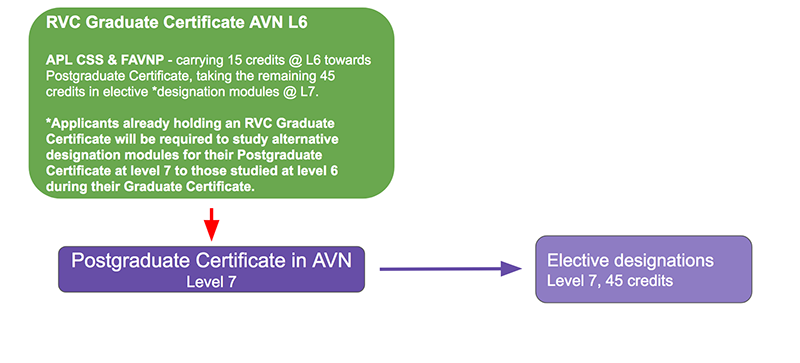
- Entry route and study pathway for holders of RVC Graduate Diploma in Veterinary Nursing
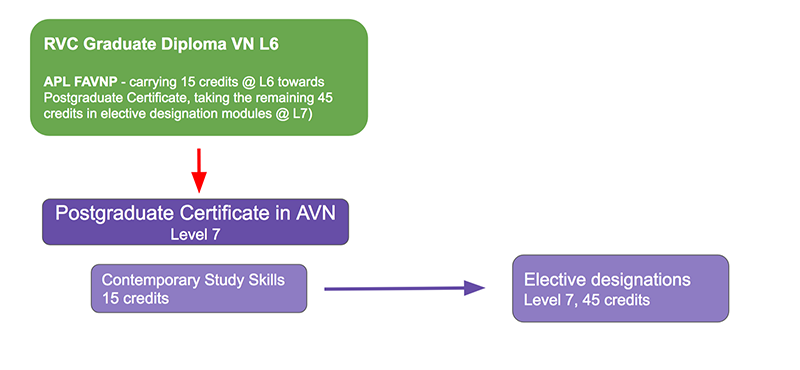
How much time do I need to spend studying?
This is a part-time programme. Like many university courses, the modules of our Graduate Certificate and Postgraduate Certificate are split up into credit-rated units and these credit units relate to an average number of notional learning hours (NLHs) that learners can expect to spend on each module. Therefore, for each 15 credits, you will have spent, on average, 150 notional learning hours (NLHs). These NLHs include time spent on reading the weekly course materials, additional reading, partaking in discussion forum activities and preparing for all of your assessment activities. This means you will need to commit approximately 15 hours a week to your studies.

Can I take breaks in-between modules?
Most of our learners complete their studies in a fixed time frame of 16 months – starting their next module as soon as one has finished. However, there is the option to formally request to defer your studies and take a break if you need to. You just need to remember that modules only run once a year and so if you take a break, it may be another 12 months before you can re-join the course to start a particular module. Overall, you have 2 years in which to complete the course. Deferral will be subject to compliance with the RVC College Regulations and Procedures and you can arrange to discuss your options with the Course Director.
What are the assessments for the designation pathways?
For the bridging module, there are two 1,500-word written assignments which you must pass in order to progress on to the rest of the programme. You will receive targeted support and guidance during the module to help you complete these written pieces of work.
For the Fundamentals in Advanced Veterinary Nursing Practice module, there are two written assignments. One is a plan for your clinical audit (see below) and the other is a review of how the RCVS Code of Professional Conduct and legislation applies to a clinical situation.
Each of the designation pathways (Anaesthesia and Analgesia, ECC and Medicine) have one summative assessment for each of the three units.
For unit one you will write a knowledge summary based on a clinical question, for unit two you will write a care report for a patient you have been involved in nursing, and for unit three you will complete a clinical audit within your practice. There is a final examination at the end of your studies comprising of three patient scenarios, which tests your application of the knowledge and understanding associated with your designation pathway.
How long are the modules and units?
The length of modules varies a little but is usually between 8 and 10 weeks in length, with a couple of weeks after to allow time for preparation of assignments which are due in after each one. This table provides an overview of each module and when they run during the course.

Is there a maximum time by which I must complete my studies?
The course is designed so that you undertake and complete each module as they are timetabled. All core modules must be taken and completed in the order they appear in the timetable. Elective modules can be taken in any order however, depending on when they run, this may affect the time it takes you to complete your studies. As mentioned above, you may also wish to defer your studies for some reason but you must complete your studies within two years of enrolling on the course.
Is it ok to be working part-time?
It is fine to be working part-time while completing the course although there may be occasions throughout the course when you find you will need to spend a little more time in certain areas of the clinic. As a guide, we advise that learners spend a minimum 15 days per 15-credit unit working directly in a suitable clinical environment.
Is it ok to be working as a locum?
We do not recommend taking this course if you are working as a locum. This is because some of the assignments are designed to be carried out over an extended period of time within the workplace. If you are working as a locum, completing this assessment activity might be challenging and we therefore do not recommend undertaking this course unless you have long-term arrangement with a particular practice.
Do I have to pay for the entire course at the start?
No, in fact, the usual way to pay for your studies on this course is on a module-by-module basis just before each module starts.
Are there any other costs to the course?
The course fees advertised on our website are the main costs you will incur during your studies. There are also some optional attendance days throughout the course, which there are no additional charges for, but you might need to pay for transport and/or accommodation for these if you don’t live locally.
How many times do I need to come to the RVC?
See Teaching and Learning for details of compulsory and optional attendance, Compulsory online attendance during the Orientation Days, and Optional attendance for Clinical Enhancement Days.
Do these courses lead to an RCVS CertAVN?
Yes, if you want them to. Our Medical Nursing, Emergency & Critical Care and our Anaesthesia & Analgesia Graduate Certificate and Postgraduate Certificate are all accredited by the RCVS and if you want to receive this award, you must also enrol with the RCVS prior to commencing your studies. More information on this process can be found on the RCVS website.
Is this a qualification that is recognised by the veterinary profession and/or internationally?
The Royal Veterinary College (RVC) is the UK's largest and longest established independent veterinary school and is part of the University of London. The RVC offers undergraduate, postgraduate and CPD programmes in veterinary medicine, veterinary nursing and biological sciences, being ranked in the top 10 universities nationally for biosciences degrees. The RVC was the first veterinary school in the world to hold full accreditation from AVMA, EAEVE, RCVS and AVBC, and currently holds full accreditation from RCVS, AVBC and AVMA and conditional from EAEVE.
We are a leading provider of higher education programmes in veterinary nursing. These range from a Foundation degree, which is accredited by the RCVS, to a Bachelor’s degree and our previous Graduate Diploma in Veterinary Nursing.
Our students come from a wide range of clinical practices, from first opinion practices, charity clinics to large specialist referral hospitals and institutions both in the UK and overseas. A number of veterinary practices regularly sponsor their RVNs to undertake our courses indicating that they find the course meets their clinical and business requirements. Our Graduates are becoming increasingly recognised in the UK and overseas via their published work and many have taken on more supervisory roles or been promoted in their existing clinical environments as a result of their qualification whilst others have used their RVC VN qualifications to gain places on MSc or BSc courses at other universities.
What level of qualifications are these Certificates?
The Graduate Certificate in Advanced Veterinary Nursing is a Level 6 university qualification and our Postgraduate Certificate in Advanced Veterinary Nursing is a Level 7 university qualification (as described in the Framework for Higher Education Qualifications) http://www.qaa.ac.uk/Publications/InformationAndGuidance/Documents/FHEQ08.pdf.
Which course is the right one for me?
These qualifications provide progression options for Registered Veterinary Nurses qualifying from all existing level qualifications (from Level 3 Diploma through to BSc). Depending on your entry qualifications, you can apply to enrol on either the level 6 Graduate Certificate or level 7 Postgraduate Certificate (see Entry Requirements)
If you’re unsure, the best thing is to contact our Admissions Team or the Course Director who can help you work out the most appropriate course to enrol on.
I have not studied for some years; will I be supported in returning to study?
Yes, definitely. The course team fully appreciate some of the challenges that part-time distance learners, who may be new to study at university or who haven’t studied for a while, face. We provide lots of support for our learners throughout the programme but particularly early on at the start of the course. Our pre-requisite bridging short-course, Contemporary Study Skills, runs for 8 weeks and is not only designed to help those learners who are new to study at university, but more importantly, to prepare learners for study using contemporary technologies whilst balancing part-time study with full-time work. As an online course, this mode of study is very different to traditional face-to-face courses and for this reason, we have made this compulsory for all learners wishing to undertake both the Graduate Certificate and Postgraduate Certificate.
The RVC’s Study Skills Team are also here to help you achieve your academic goals effectively, efficiently and with maximum enjoyment. The team provide support in time management, communication skills, team working, creative thinking and learning, research skills, reading skills, academic writing, numeracy, revision and exam technique (amongst others). Telephone and/or Skype tutorials and learning support sessions can be arranged to suit your needs. The RVC’s Study Skills Team are also experienced in working with students with English as a second language and those with specific learning differences (SpLD) such as dyslexia and dyspraxia. We can also help you access specialist dyslexia advisors and tutors if needed.
What does my practice need to do?
Studying part-time whilst working is a big commitment and we hope that your practice will be understanding and supportive of you during your studies. Ultimately the course is aimed to enhance and develop your existing knowledge and skills and enable you, the RVN to reflect on your practice. This skill enhancement and development will benefit the practice in the long term and we’ve seen that learners who receive help and support from their employers are more likely to be successful. In practical terms, this may mean that on occasion, you may seek support and guidance from members of your veterinary team at work. We encourage you to select someone from work who can act as a mentor for you during your studies on the CertAVN and you might find it helpful to set aside a few designate times for you to meet up and discuss your progress on the course. If this is not possible, even arranging times to discuss and review practice workload to best accommodate your studies at certain times of year might be useful.
Additionally, as a part of your studies you will be required to carry out a clinical audit within your workplace, and you will need the support of your practice team to do this. It would be useful to discuss this in advance so that you are prepared when you need to start this assessment activity.
I am a UK Resident, but live and work abroad at the moment. Can I study for this course and will I be charged the overseas rate?
You can see a brief run-down of how fee status is determined here, or in more detail on the UKCISA website. If, after applying, we require more information in order to determine your fee status, you will be sent a fee status questionnaire. It would be useful, when you return this, to include copies of documents such as temporary visas, fixed term contracts, or anything which shows continuing ties to the UK.
What happened to the Graduate Diploma in Veterinary Nursing (GradDipVN)?
The Graduate Diploma in Veterinary Nursing programme is no longer running, however, based on the success of this qualification, we are delighted to announce our replacement qualifications; the Certificates in Advanced Veterinary Nursing.
 Taster Sessions
Taster Sessions
Curious about the Certificate in Advanced Veterinary Nursing (CertAVN) and want a flavour of what it’s like to study with us while earning free CPD hours? Join us for our free taster sessions. Register at the links below:
CertAVN Taster Session: Medical Nursing Wednesday 29 October 2025 20:00
CertAVN Taster Session: Emergency & Critical Care Tuesday 2 December 2025 20:00
CertAVN Taster Session: Anaesthesia & Analgesia Tuesday 6 January 2026 20:00
Tuition Fees
The tuition fees for students commencing the course in 2025 are as follows:
|
Home Tuition Fees including Island Fees (Channel Islands & Isle of Man) |
International Fees |
|
|
CSS |
£1,110 |
£1,370 |
|
FAVNP |
£1,110 |
£1,370 |
|
Designation Elective Module |
£3,320 |
£4,110 |
|
Total Fee |
£5,540 |
£6,850 |
The tuition fees for students commencing the course in 2026 are as follows:
|
Home Tuition Fees including Island Fees (Channel Islands & Isle of Man) |
International Fees |
|
|
CSS |
£1,110 |
£1,370 |
|
FAVNP |
£1,110 |
£1,370 |
|
Designation Elective Module |
||
|
Total Fee |
£5,540 |
£6,850 |
Tuition fee amounts are subject to increase each academic year, please be aware of this when making your calculations and planning how much money you will require.
RCVS fees
Candidates applying for and enrolling with the RCVS in order to gain an RCVS Certificate in Advanced Veterinary Nursing are required to pay additional fees as set out by the RCVS as follows:
- Pay RCVS initial enrolment fee of £87* at the start of the course
- On completion of the course, £220* to the RCVS
For more information about RCVS fees please see their website: RCVS Fees.
* Fees at September 2025. Check RCVS website for current fees.
